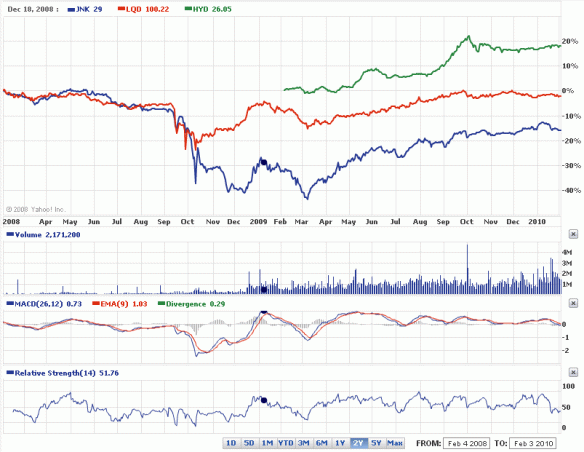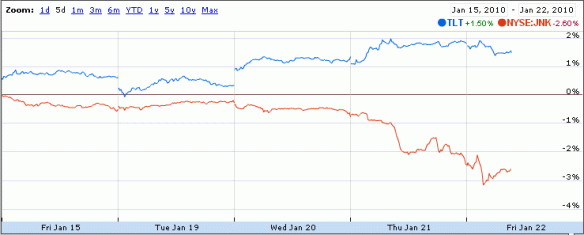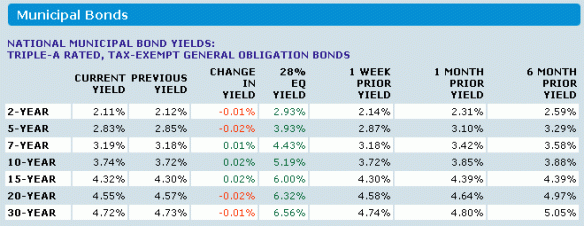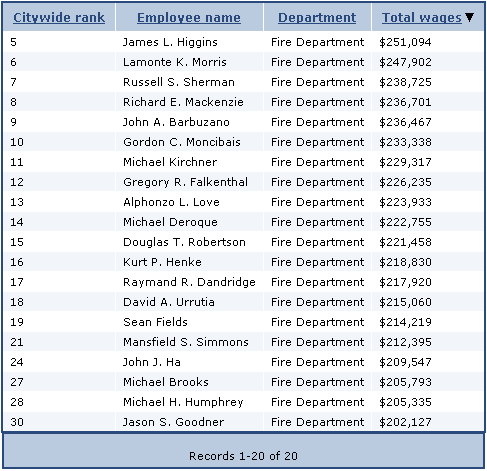Mish has been swamped lately, posting what seems like at least two stories a day about the insolvency and incredible stupidity of state and local governments.
See these stories for examples:
School Crisis in Nevada: Governor Seeks to Cancel Collective Bargaining With Schools Because the State is Broke
Economically Illiterate Quote of the Day 2010-02-03: This Quote Concerns the LA Budget
Neil Barofsky Promises Handcuffs; Police Pay Dispute In Miami; Workers Protest In NM; California Muni Bond Outlook, Other Potpourri
During the boom, as tax receipts increased, it became the norm for state and local governments to inflate their budgets by five, eight or ten percent per year, mainly in the form of guaranteed pay raises and defined benefit retirement plans for goverment workers, as well as excessive hiring for jobs that have no use or would be better left private.
I can’t tell you how many times I’ve read about little towns paying mid six figure salaries for cops who’ve only been on the force for 5-10 years, or 100-200k for firemen or mid-level admininstrators. Even secretaries for city executives often make 80-150k, and most of these people get to retire with guaranteed cushy benefits at a much earlier age than in the private sector.
Many public employees belong to what have become the most powerful unions in the country. Their pull with politicians delivers fat pay raises and insurance benefits that almost nobody else gets these days. It used to be that government jobs were the worst — where the class idiots ended up working, but now it seems like the joke is on the high-achievers, since government unions have become the best racket in town.
The Ponzi is over.
What all of this has lead to is states taking on incredible amounts of debt to cover these costs, while counting on increased tax reciepts forever. Now that the real economy is hurting and taxes are down, governments find themselves struggling pay. They are using all kinds of gimmicks to keep the game running, like accelerated tax payment schedules, higher fees on car registration, public transit, toll roads and the like, and installing more of those Orwellian traffic cameras. They are also making a big stink about how essential services like schools (better left private anyway), police (too many bullies with war toys), fire (better all-volunteer) and trash pickup (why on earth not fully private?) will be cut unless they pass tax increases.
These threats are all nonsense — governments always cut the stuff that people notice in order to show how important they are to daily life and to trick the public into assenting to taxes, when the real problem is the outlandish pay of the tax-feeders. Think about it: do you get more from your government than 10 years ago? Better roads, more frequent trash pickup, cleaner parks, better schools, safer streets? I doubt it, but I bet your state and local governments are spending twice as much as they were in 2000 (7% spending increases for 10 years doubles the budget).
The gimmicks aren’t going to last. The debt is unpayable unless the federal government covers it (since the feds have a Fed to buy unlimited debt with funny money), and I doubt that this is going to happen. It is just not a priority for the individuals who control Congress and the White House. They need the Treasury’s last bit of credit to keep the wars going, backstop the next round of banking losses, and to keep the unemployment, medical and social security checks flowing (if entitlements are halted, things will get ugly).
Cities can declare bankruptcy, and they have from time to time. States cannot declare bankruptcy, but they can sure default.
Joe Q. Investor is certain that bonds are safe.
This whole situation seems lost on the investing public, which piled into municipal bonds during 2009’s credit binge. After all, stocks are too risky! Municipal and low-quality corporate debt is likely to be one of history’s major crashes, and these markets seem to be rolling over already. Debt investors looked into the abyss in 2008, but in this climate of record complacency, people have forgotten how little is backing up these securitized promises.
This is not an easy sector for retail investors to short, but there are some instruments available. I’m either short or planning to take short positions in the following ETFs: HYD (high-yield munis), JNK (junk corporates) and LQD (investment-grade corporates). This is not a short-term play, but with patience this market should roll over big time.
Here’s a chart (click the image for a larger view):

Source: yahoo! finance
–
A pure play on wider credit spreads could be made by also going long Treasury debt at durations that match the average in these bonds. IEF is a 7-10 year Treasury ETF, TLT is 20-30 year T-bonds, and of course there are very liquid futures markets in 2, 5, 10 and 30 year Treasuries.










